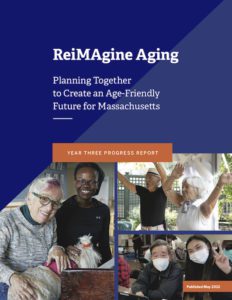Who is a member?
Our members are the local governments of Massachusetts and their elected and appointed leadership.
 In its mission to improve the quality of life for all residents, the state has released its third annual progress report on efforts to make Massachusetts more age- and dementia-friendly.
In its mission to improve the quality of life for all residents, the state has released its third annual progress report on efforts to make Massachusetts more age- and dementia-friendly.
The 68-page report, “ReiMAgine Aging: Planning Together to Create an Age-Friendly Future for Massachusetts,” was released in early June by the Executive Office of Elder Affairs. It reviews the work done by communities and organizations in making the “places we live, work, and play better places to grow up and grow old,” and tracks the state’s progress in achieving the goals of ReiMAgine Aging, the state’s multiyear, age- and dementia-friendly action plan.
The age-friendly movement seeks to make communities more welcoming and livable for older residents and for people of all ages. Massachusetts joined the AARP Network of Age-Friendly States and Communities in 2018.
The report notes the challenges officials confronted in advancing their efforts in the face of pandemic challenges and the increasing urgency to address racial injustice. In the report’s introduction, Gov. Charlie Baker said the people involved in the movement “made the unbearable bearable,” through collaboration and adjusting their efforts over the past couple of years.
“On so many issues, including the age- and dementia-friendly movement, the people of Massachusetts have led the way,” Baker states. “We continued to see people coming together — older adults, caregivers, community leaders, and organizations — creating a path for a better today and a brighter future.”
Specifically, the report reviews the state’s performance in 2021 over six areas of age- and dementia-friendly work:
• Community: Deepening and strengthening age- and dementia-friendly efforts to be inclusive of all communities and populations
• Information and communication: Providing information in an accessible and user-friendly manner to residents, organizations and municipalities
• Framing: Changing the conversation about aging from a “challenge” to an “asset,” increasing literacy about aging issues, and eliminating ageist images and language across social, print and other media
• Policy and practice: Encouraging the adoption of age-friendly policies and practices in all sectors
• Economic security: Improving economic security of older adults and caregivers
• Sustainability: Creating a sustainable infrastructure to guide and support the work of Age-Friendly Massachusetts and partner initiatives
According to the report, 21 communities joined the age-friendly movement in 2021, including cities such as Framingham and Greenfield, and smaller communities such as Leyden, New Salem, Warwick and Wendell.
The report includes insights from residents and local officials from around the state, including Madeline Noonan, Barnstable’s director of community services.
“In Barnstable, we believe that age-friendly communities are great places to grow up and grow old and that implementing age-friendly practices is an investment in the future health, vitality, and sustainability of the town,” Noonan states in the report. “This process will ensure that every community member has the opportunity to thrive, regardless of age or ability.”
Feedback about the report and the age-friendly effort is welcome, by emailing Aging.Conversation@mass.gov.